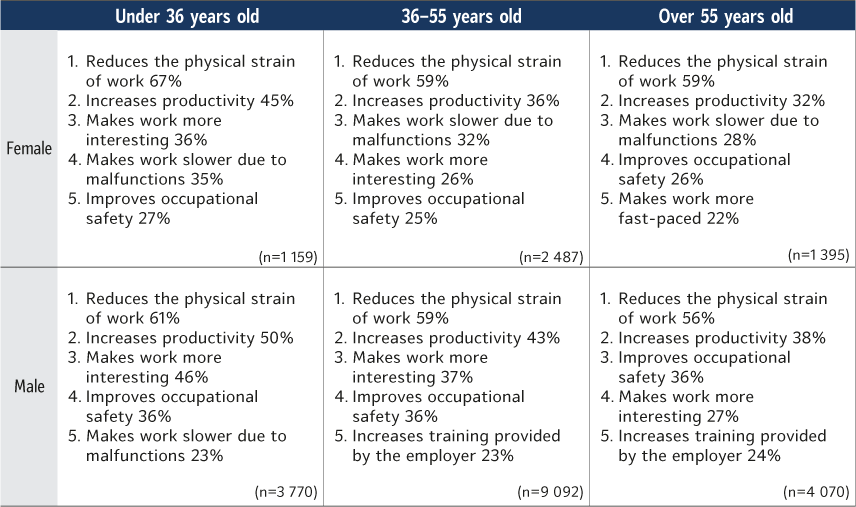Perusduunari muiden joukossa –
5. “I place orders and send off the robot”
Among Industrial Union members (N=21,967), concerns about the future and career prospects are especially focused on the weakening of working conditions (41%), sufficiency of jobs (25%) and global changes (19%). These three top concerns are the same as in the 2020 member survey. On the other hand, changes in work (9%) and sufficient professional competence (6%) are not as frequent causes of concern among members.
The older the respondent, the more worried they are about worsening working conditions, sufficiency of work and changes in work. Members under 36, on the other hand, are clearly more concerned about global changes than older generations, as well as the adequacy of their own professional competence to a slightly greater degree.
The views of women (N=5,042) and men (N=16,932) who responded to the survey also differ. Female members are concerned about the sufficiency of jobs, changes in work, and sufficient professional competence slightly more often than males. On the other hand, men are clearly more concerned about global changes compared to women.

Different concerns about the future
Worsening working conditions are a cause for worry equally among both women and men. Among members under 36, just one in three (35%) say that the issue worries them, compared to 44% of respondents over 36. Low pay (28%) was the most frequently named concern related to working conditions. Significantly fewer respondents were concerned about occupational safety and coping at work (8%) and uncertainty of employment (5%).
The second most common response when asked what worries respondents was the sufficiency of jobs (25%). Over one in four women (28%) say they are worried about the issue, slightly more than men (24%). There was no difference in views between age groups. Finding work in the same town or city (14%) and having to move elsewhere for work (6%) are the top concern for one in five respondents. Becoming unemployed because of automation (4%) was clearly a less common concern. Respondents identified other reasons why jobs are being lost beyond the “creative destruction” of the markets.
– The way things are going, a lot of places are going to be out of work because there are no skilled young workers to be found. Manufacturing jobs are going to China and other countries, says one middle-aged metalworker.
When asked what about the future is a cause for worry, one in five respondents (19%) listed global changes as a concern. Of these, the most concerning were financial crises (14%). One in four (24%) respondents under 36 named this as their top cause for worry, clearly fewer (11%) respondents over 55 shared the same concern.
A small percentage are mainly worried about climate change (3%) or immigration (3%). Respondents’ views are split on climate change and the associated green transition and immigration.
– The green transition is going to take away hundreds of jobs around here in the coming years. It’s a little worrying. Hopefully, it will also create new jobs, says one young metalworker.
Digitalisation not a concern for members
According to the average industrial worker, the least worrying future change in the nature of work is the digitalisation of production (2%) Similarly, only a small percentage (4%) say they are worried about going out of work due to automation. A positive view of new technologies can be explained by both attitudes and personal experience.
The majority of respondents (65%) say that their workplace uses mobile devices such as smart phones and tablets. Simple automated machines (38%) and robots (28%) were also used fairly commonly at workplaces.
One in four (23) of respondents say that their duties include working with robots or automated machines. Respondents who work in the chemicals industry (34%) and metal industry (33%) were the most likely to work with and alongside robots.
The majority of respondents in the member survey feel that robots and automation reduce physical workload (59%) and improve productivity (42%). In addition, the average industrial worker feels that new technologies both make work more interesting (34%) and improve safety at work (34%).
